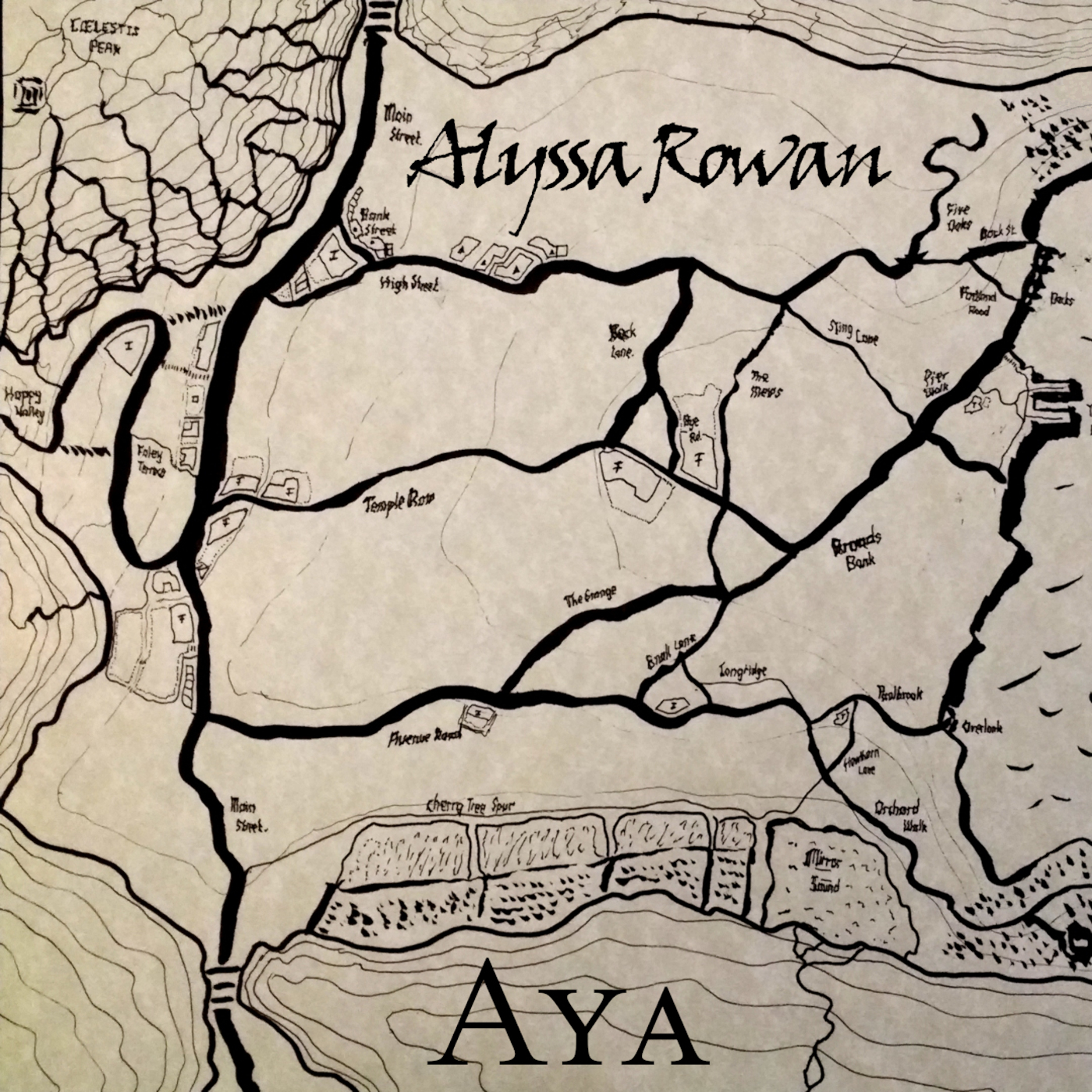Aya is a 10 track debut album, by Alyssa Rowan. Catalogue number: RR-AKR-1901
Links
- Bandcamp: https://alyssarowan.bandcamp.com/album/aya
- Spotify: https://open.spotify.com/album/6hwYplxkJSmId36Qrd1b2T
- YouTube: https://music.youtube.com/playlist?list=OLAK5uy_nhIgQEqyAD_EbrTOQGCV_w0rqqziDWrck
Artwork

About
After many years of music, and a long break, my first actual album, I did almost by accident; as I composed some background music for a D&D campaign I ran over 2018–2019, and when we finished, I realised I’d made an entire album worth of music, and it’d be a shame if I didn’t do anything with it.
At the time, I said, it’s not very special, it’s far from perfect, there are lots of mistakes and it’s not really mastered or anything — but it’s a thing I did, and for what it’s worth, here it is.
I’m glad I released it.
Pine is the earliest track on there, and is the theme of the peaceful and prosperous inland mountain city of Mirror Lake, the rather sparse and unfinished map of which makes up the album art. The party started off trying to get there, and that’s where the adventure really started… with the aboleth in the lake, stealing a magical jewel from a mansion for a spy, foiling a pair of assassins sent after them, one of the party gaining either a blessing or a curse (depending on how you look at it) in a mountain temple, and encountering a mysterious magic item vendor who was far more important than he appeared, although they didn’t know that at the time. The track as released contains two full loops.
Nessen was done the night before release, but never actually got used during the campaign. There’s a PaulStretch VST in there as part of the processing and the pad is quite a lot of layers.
The Moondust series were all one huge bizarre dungeon, and are mostly highpassed because I had a deep low drone in the background when played live, and seamlessly morphed between the tracks during play for an adaptive/reactive soundtrack — Goddess Blues has a recreation of the drone in it and is rather nicely Bladerunner-esque, and Arp Tang (based on a complex Helm arpeggiator patch that kept resetting whenever you looked at it wrong) is surprisingly popular (it just ends like that because it actually loops, but the release isn’t seamless).
Moonshot, though short, was inspired by Siddhartha Barnhoorn’s OST for Antichamber. I wanted an unsettling sting that would spin my players around when they accidentally found themselves walking on the black sands of one of the moons after a teleportation went horribly wrong.
The Starfall trilogy was for the very end of the adventure. Melancholy, reflective and brooding — given the party had willingly allowed an NPC to sacrifice herself to bring the Night Star down to earth, destroying an entire continent and visiting upon the survivors the primal horror of the never-before-seen true darkness of the night sky from then on, all so the sorcerer could summon, and Wish to destroy, the kaiju-like planet-eating Tarrasque. Was such a noble goal worth such a deep sacrifice? Had they become villains after all, who ended up destroying almost everything in a misguided attempt to ‘save’ it? Although ‘The Saviours’ prevailed and were rapidly triumphant in the climactic fight, they had to make a swift exit with their few remaining friends from a ruined city as the smoke rose and the dawn broke, unsure if they’d really done the right thing after all…
The homebrew setting for this campaign became, after the events of that campaign, a whole new setting which is my current one — but that’s another story…
Credits
Produced with REAPER and played on an Alesis VI61.
I don’t remember everything I used, because it was fairly early on, and some of the plugins were free and fairly scuffed. Arminator features, I’m pretty sure, as does Helm, and Spitfire LABS. I bought Valhalla Shimmer midway through the album and it’s in chronological order except track 2.
Dedicated to my girlfriend Megan; and to my players: Nāomi, Hannah, Ash and Nico.
Album art: Alyssa Kimberley Rowan, an edited version of a self-produced tabletop map; medium: ink with brush pen on parchment.
© 2019 Alyssa Kimberley Rowan • ℗ 2019 Rowan Recordings • See Copyright Policy.